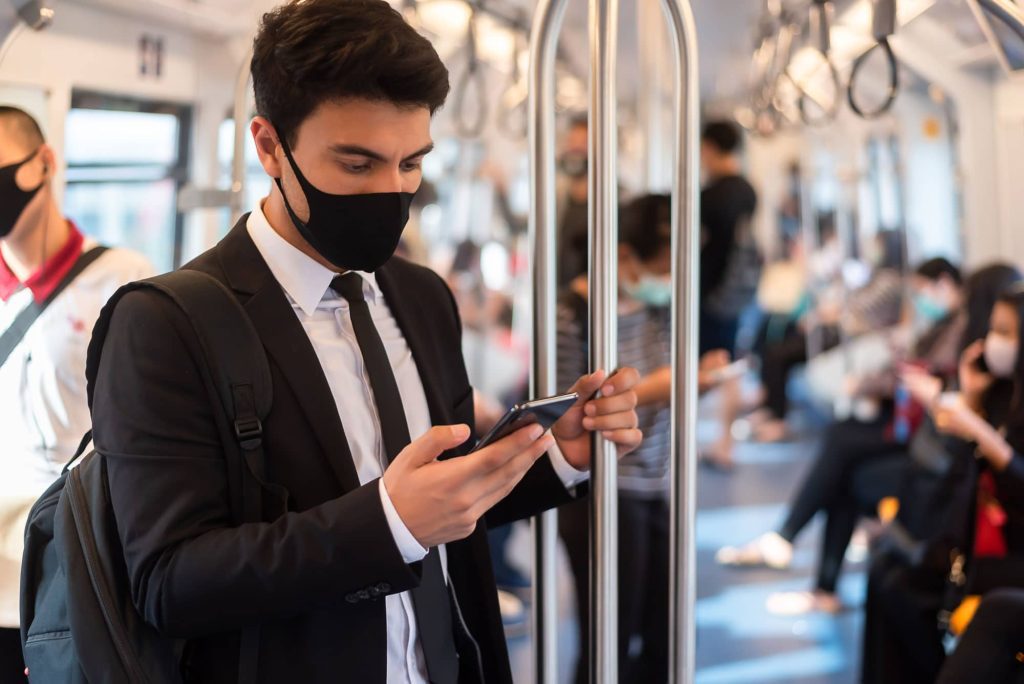Can face masks help slow the spread of the coronavirus (SARS-CoV-2) that causes COVID-19?
Yes, protective masks combined with other preventive measures, such as frequent hand washing and social distancing, help slow the spread of the virus. This is the message we hear from the Canadian and Quebec governments.
So why were face masks not recommended at the start of the pandemic? This is one of the questions we often answer at EPI Canada.
At the start of the pandemic, experts did not know how well people with COVID-19 could spread the virus before symptoms appeared. It was also not known that some people had COVID-19 but had no symptoms. Both groups can transmit the virus to others without knowing it.
These findings have led public health groups to flip-flop on masks. The World Health Organization and Public Health now include masks in their recommendations to slow the spread of the virus. We recommend procedure masks (the famous blue masks) and handmade fabric masks for the public and not the surgical or N95 type masks necessary for health care providers.
How do the different types of protective masks work?
Surgical masks
Also called a medical mask, a surgical mask is a loose-fitting disposable mask that protects the wearer’s nose and mouth from contact with droplets, splashes, and droplets that may contain germs. A surgical mask also filters out large particles in the air. Surgical masks can protect others by reducing exposure to saliva and respiratory secretions of the wearer of the mask.
This type of (surgical) mask is currently the most worn by the general population. They provide good protection against the coronavirus, but they protect less than N95 masks.
N95 respirator masks
A N95 mask offers more protection than a surgical mask because it can filter out both large and small particles when the wearer inhales. As the name suggests, the mask is designed to block 95% of very small particles. Some N95 masks have valves that make them easier to breathe. With this type of mask, unfiltered air is released when the wearer exhales.
Healthcare providers should be trained and pass a fit test to confirm a proper seal before using an N95 respirator in the workplace. Like surgical masks, N95 masks are disposable masks. However, researchers are testing ways to disinfect N95 masks so they can be reused.
Some N95 masks, and even some cloth masks, have one-way valves that make them easier to breathe. But because the valve releases unfiltered air when the wearer exhales, this type of mask does not prevent the wearer from spreading the virus. For this reason, some places have banned them.
Cloth face masks
A fabric protective mask is intended to trap droplets that are released when the wearer speaks, coughs or sneezes. Asking everyone to wear cloth masks can help reduce the spread of the virus from people who have COVID-19 but don’t know it.
Cloth face coverings are most likely to reduce the spread of the COVID-19 virus when widely used by people in public places. Countries that opted for masks, testing, isolation, and social distancing at the start of the pandemic have succeeded in slowing the spread of the virus.
Face masks can be made from common materials, such as woven cotton sheets. Instructions are easy to find online. Cloth masks should include multiple layers of fabric.
Since the increased availability of surgical masks and N95 Masks on the market, face coverings and cloth masks have been neglected by most wearers. Surgical or procedure masks as well as N95 masks offer better protection against viruses and bacteria.
At first, it was difficult for many people to get used to wearing a mask. The initial advice was:
Start slowly. Wear your mask at home for a short time, for example while watching television. Then wear it on a short walk. Slowly increase the time until you feel more comfortable. But do not forget to wear it at all times in public and to respect the health instructions in force.
Find your fit. If your mask is uncomfortable or too hard to breathe in, consider other design options.
At Alco Prevention Canada, we have single-use (disposable) masks that offer different levels of protection. Level 1, 2 or 3 masks that offer various degrees of filtration to meet all your specific needs in terms of protection and price. We also have masks in various colors that give a little life and color in this difficult time.
We also have high filtration masks (level 3) that meet CNESST standards and are made in Quebec. Here are some of their features:
- Ultra-efficient filtration with bacteria filtration (BFE) of ≥ 98%.
- Particle filtration efficiency at 0.1 µm (EFP) ≥ 98%.
- Resistance to synthetic blood penetration of 160 mm Hg
- Differential pressure: <6.0 mm H2O/cm2
- PTFE filtering membrane: retains its high level of protection unlike some conventional membranes which lose their effectiveness over time.
We also offer Black or Blue Anti-fog Level 3 Medical Masks that meet CNESST standards and are made in Quebec. Here are some of their features:
- Anti-fog
- Hypoallergenic
- Ultra soft as silk!
- 4 layers of fabric
- 4 ply
- Stabilizing nose band
- Latex and fiberglass free
- Bacteria filtration efficiency (BFE) ≥ 98%
- Particle Filtration Efficiency (PFE) at 0.1μm ≥ 98%
- Resistance to synthetic blood fluids: 160 mm Hg
- Differential pressure < 6.0 mm H2O/cm2
- Flammability: Class 1
In addition, all our level 1, 2 and 3 single-use masks have common characteristics, namely:
- Hypoallergenic
- Latex and fiberglass free
- Flexible and adjustable nasal strip
- Comfort and lightness
- Moisture wicks away easily
You will surely find the type of masks you need among our wide selection of masks.
